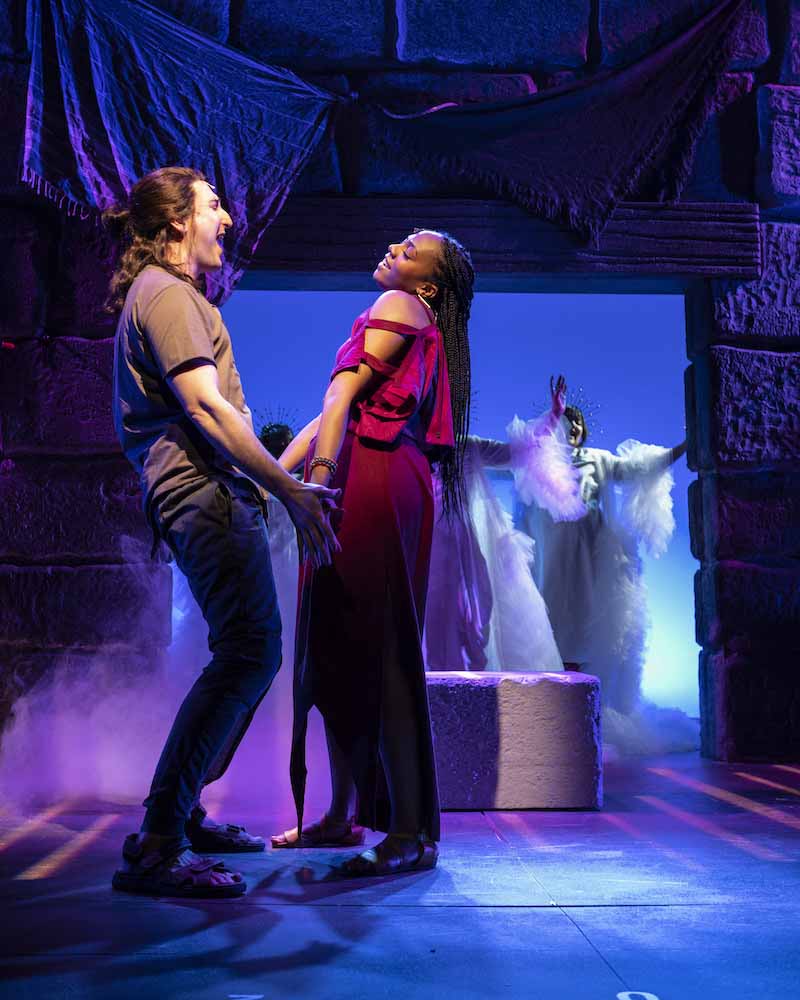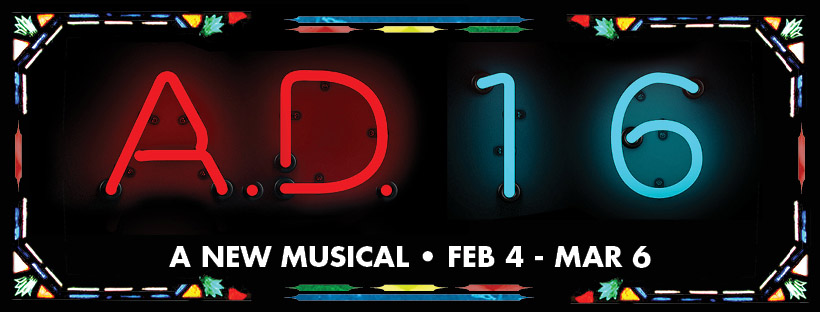In A.D. 16 — a magnificently entertaining new musical now playing at Olney Theatre Center — 16-year-old Mary of Magdala crushes on 16-year-old Jesus of Nazareth. So it’s a passion play of the lovestruck sort.

Among the show’s many charms is its depiction of Jesus. As imagined by Bekah Brunstetter (book) and Cinco Paul (music, lyrics, and story) in their Bible-alluding tuner, the future reputed Savior is a nerdy dude with long hair and a man bun, and what would be a surfer vibe if Nazareth had nearby waves. Not only is he an inadvertent heartthrob — the neighbor girl Mary seriously thirsts for him — but he is also nonchalantly in prep for his adult gig in earthly ministry. In both dimensions of his character, we see him on a learning curve of love.
There’s a point in Act One, for instance, when Jesus is slapped across the face by an officer of the Sanhedrin, the local patriarchal law enforcement squad. “Again,” says Jesus, turning his other cheek. Whereupon the officer decks him.
Mary rushes to comfort her fallen flame.
MARY: Are you okay?
JESUS: I’m good. Not the first time that’s happened.
MARY: Why’d you turn your other cheek to him?
JESUS: It’s a new concept I’m working on…. Still kinda figuring it out.
MARY: You’re amazing. That’s amazing. I can’t stop saying amazing.
JESUS: Thank you for your kindness.
The joke, which runs throughout the show, is that teen Jesus doesn’t yet have the messiah thing down. He’s still trial-and-erroring the basic skill set, like parable telling and healing. But what this turn-the-other-cheek fail makes cleverly explicit is that Jesus doesn’t do mano-a-mano manhood and isn’t about to. Given today’s white evangelical idolization of reckless and rugged masculinity (See Jesus and John Wayne by Kristin Kobes Du Mez), that fleeting funny scene is also a reminder of a life lesson lost on the world at great cost.

At another point in the story, Mary learns that Jesus spends time visiting folks in the local leper colony outside the city walls, and to find him she goes there too. The ensemble of lepers — who function in the show as a metaphor for the marginalized — have an extraordinary song called “The Skin We’re In” that calls out the culture’s curse on them.
Some people like to look at your exterior
and think that they are better than you
If they convince themselves that you’re inferior
they’ll feel better ‘bout the things that they do
Seeking to impress Jesus with her do-gooder “charity, mercy, compassion, the yooj,” Mary undertakes to lead the band of lepers back into the city from which they were banished, to be with the families who cast them out. It does not go well. The lepers are imprisoned and further oppressed.
There follows a scene between Jesus and Mary that is one of the most dramatic moral pivots I have ever seen in a musical. In a song called “You Did It for Yourself,” Jesus calls Mary on the self-interest in her “doing good just to be seen”:
All that you did that night
served you and you alone…
It’s not only what we do
but what lies within our hearts
that demonstrates love is true
In that moment and in that scene, Mary sees (and so do we) that Jesus has now begun to speak of a love that transcends what she felt when she fell for him. And at that juncture — that one-to-one personal calling to account of conscience — A.D. 16 as a musical turns into a stunning epiphany of the highest form of love — what the Greeks called agape, as distinct from eros, or erotic love, and philia, or brotherly love.
The theme continues in the final scene of the play when (spoiler alert) Jesus and Mary part ways:
JESUS: Mary, if I ever had a girl, it would be you. But I think I’m on this earth for a different kinda love. There’s a bigger kind of love than — this. There’s the kind you can have for everybody else. Your enemies, your neighbors, people who scare you.
MARY: Yeah. You gotta love them like they’re yourself.
JESUS: Love your neighbor like they’re yourself. That’s good, can I steal that?
MARY: Please, what’s mine is yours.
JESUS: Oh, that’s good too.
Here the humor and the homily of the play become as one.
And a beautifully profound new musical is born.
Running Time: Two hours and 20 minutes, including one 15-minute intermission.
EXTENDED: A.D. 16 plays through March 20, 2022, on the main stage at Olney Theatre Center—2001 Olney-Sandy Spring Road in Olney, MD. Regular performances are Wednesday–Saturday at 8:00 pm; matinees on Saturday and Sunday at 8:00 pm; and a Wednesday matinee at 2:00 pm on February 9, 23, and March 2. Tickets ($42–$85) can be purchased by calling 301-924-3400 or online. Discounts are available for groups, seniors, military, and students.
The program for A.D. 16 is online here.
There will be a sign-interpreted performance on Thursday, March 3, 2022, at 8:00 pm and an audio-described performance for the blind and visually impaired on Wednesday, February 23, 2022, at 8:00 pm. Audience members who wish to use these services should contact Julie Via, Patron Services Manager ([email protected]) to confirm.
COVID Safety: Masks and proof of COVID vaccination are required to attend for all patrons. Exemptions may be made for those who are not vaccinated, such as children under 5, people with certain medical conditions preventing vaccination, or those with closely held religious beliefs. These patrons must provide proof of a timely negative COVID-19 PCR test taken within 48 hours or a rapid antigen test taken within six hours of showtime. Visit OlneyTheatre.org/vax for more information.
SEE ALSO:
Olney’s new musical ‘A.D. 16’ entertains immensely (review by Darby DeJarnette)





